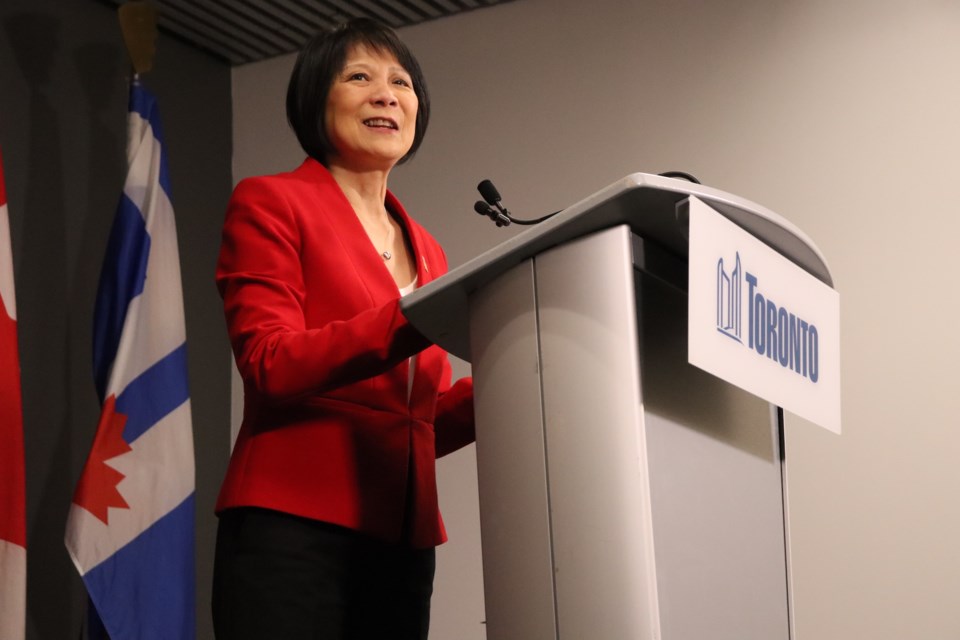Toronto city councillors are united in standing up to U.S. President Donald Trump’s tariffs. They just have vastly different opinions on how to go about it.
On Wednesday, several councillors tried to amend Mayor Olivia Chow’s tariff response plan after raising concerns about the effect it could have on taxpayers and the city’s economy.
Chow’s plan includes banning U.S. companies from bidding on city contracts below a certain threshold and prioritizing Canadian suppliers; “limiting” city employee use of American-based rideshare companies like Uber; deferring up to six months' worth of property taxes for companies hurt by tariffs; and more.
“What we’re doing at council seems to be governing by emotion,” said Don Valley East Coun. Jon Burnside. “What we need to do is develop a strategy with other levels of government who have deep pockets and who have the resources to actually do stuff that’s meaningful.”
Burnside said the city shouldn’t give preference to Canadian companies because competitive and open procurement better serves taxpayers.
“If a Canadian company wins a contract, that’s great. If they don’t win, it’s because they’re either too expensive or delivering an inferior product,” he said.
City staff said around three per cent of Toronto’s $3-billion procurement budget goes to American and other international companies, with the other 97 per cent going to Canadian suppliers.
York Centre Coun. James Pasternak had similar qualms about how the mayor’s plan could impact the city.
“Economic nationalism as a response to economic nationalism creates all kinds of problems,” he said.
Pasternak said he’s worried about the message Chow’s plan sends to American tourists, especially ahead of the 2026 FIFA World Cup.
“What we don't want to do is send a signal that Americans are not welcome. We don't want to send a signal that we're anti-American,” he said. “The rhetoric coming out of the White House does not reflect the overall view of Americans.”
Several councillors tried to amend Chow’s plan, though few were successful.
Chow ally wavers
Toronto-St. Paul’s Coun. Josh Matlow added a sunset clause to the plan that would go into effect if the federal government strikes a new trade deal with the Trump administration.
Matlow’s trepidation was notable, considering he sits on Chow’s executive committee, a powerful cabinet-like body comprised of the mayor’s allies and key council members.
During debate on the plan at last week’s executive committee meeting, Matlow expressed similar concerns and left the room before the vote so his opposition wouldn’t be recorded in the official tally.
Etobicoke Centre Coun. Stephen Holday wanted to direct staff to bolster infrastructure at Toronto’s ports, which generated over $460 million in economic activity in 2022, according to PortsToronto.
However, Coun. Paula Fletcher effectively neutered Holyday’s motion over concerns it would harm the existing framework governing the development and operations of the Port Lands. Instead of bolstering the port, Fletcher’s motion directed staff to continue working under the current regime.
Don’t make local workers 'collateral damage’: Bradford
Beaches-East York Coun. Brad Bradford, one of Chow’s most vocal critics, got into a testy exchange with the mayor after he tried to remove the plank that curtails city employees’ use of American rideshare companies.
While the rideshare giants like Uber might be American-based companies, they employ scores of people in the local economy, from those in marketing and communications to drivers, Bradford said.
“These are good jobs. They are important jobs. In our effort to mount a strong response to what’s going on south of the border, we ought not to make Canadian workers collateral damage,” he said.
“Why would you, in the middle of a trade war, not give priority to Canadians, especially local companies, that are struggling to get riders?” Chow asked.
Bradford’s motion failed by a 17-5 vote.
Shortly before 3 p.m., council passed the amended plan by a 23-0 margin, despite the concerns raised throughout the debate.
Earlier in the day, Coun. Shelley Carroll noted council’s efforts to respond to the tariffs will continue to evolve as the situation changes south of the border.
“This action plan is going to be spread out over time. You’re looking at the first tranche of actions. There will be more,” she said.




